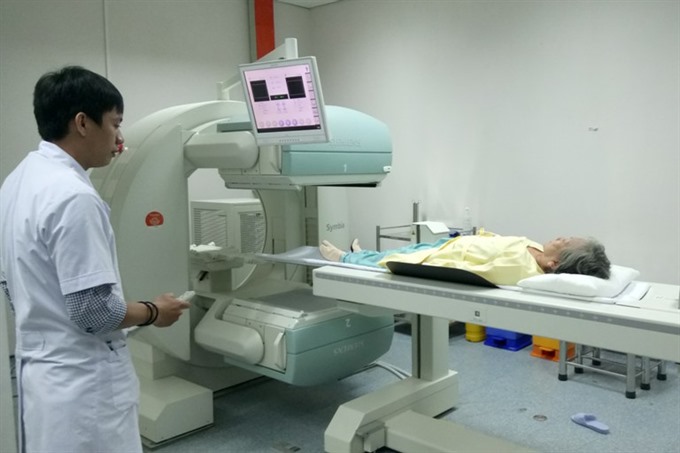 Society
Society

A Nobel prize-winning therapy offers a beacon of hope for the mounting number of cancer patients in Việt Nam, however, doctors caution that expectations should be tempered.
 |
| A doctor gives health examination to a patient with bone cancer. Việt Nam records some 164,600 new cancer cases each year, or there would be 151.4 cancer patients for every 100,000 people. — VNA/VNS Photo Lê Xuân |
HÀ NỘI — A Nobel prize-winning therapy offers a beacon of hope for the mounting number of cancer patients in Việt Nam, however, doctors caution that expectations should be tempered.
Last week, two immunologists – James Allison from the University of Texas’ cancer centre and Tasuku Honjo from Japan’s Kyoto University – were declared winners of the prestigious Nobel prize in medicine for their landmark discoveries of two different ‘brakes’ that, when deactivated, would unleash the full offensive capacity of the body’s immune system in attacking cancer cells.
Their research, conducted separately nearly 30 years ago, resulted in the development of ‘checkpoint inhibitor’ drugs, or medicines that would ‘activate’ the immune cells (T-cells) that would otherwise lay dormant against tumours – which are basically unchecked, abnormal cell growth.
Dr Lê Văn Quảng, deputy director of the Hà Nội-based K Hospital – the country’s top cancer hospital – said that a range of late-stage or metastasized cancers, including lung, melanoma, stomach, lymphoma, liver, and urethra cancers are amenable to the therapy.
The treatment, on paper, seems much more attractive to cancer patients as it ‘weaponises’ the patient’s own body’s defensive system to target only the abnormal cells, while the conventional alternatives of chemotherapy and radiotherapy have much wider and indiscriminate destructive effects as the chemicals and the radiation kill off both cancer and healthy cells alike, devastating the patient’s health.
The activated immune cells therapy had already been deployed at the hospital and a number of different cancer institutions across the country, Quảng told the media at a recent press briefing.
So far, about 20 patients had undergone the treatment at K Hospital since late 2017 and witnessed very positive results, he said.
More long-term observation and clinical examinations will still be needed to obtain solid evidence on the actual effectiveness of the new treatment method, however, according to Quảng.
“The potential of the therapy is considerable; still, immunotherapy is not suitable for every cancer patient. Even with the same type of cancer, several factors including cancer stages and tumour characteristics would need to be considered [to decide whether the therapy should be used],” Quảng said.
Đào Văn Tú, director of the Clinical Trials Centre under K Hospital, stressed that the "activated immune cell therapy is not the ultimate cure but it only inhibits the development of cancer cells, which in turn, helps to prolong patients’ life and improve their life quality".
Citing the case of a 60-year-old patient with lung cancer, Tú said that the original prognosis was that he could only live for another 4-5 months, but a combined scheme of checkpoint inhibitor drug, chemotherapy and radiotherapy managed to slow the growth of the tumour.
The patient enjoyed a relatively healthy life for another two years as a result, Tú said.
“In most cancer cases, effective treatment can only be achieved via a comprehensive and multi-paradigm approach. Successes won’t come from a single treatment method,” Tú cautioned.
In Việt Nam, Pembrolizumab, an antibody that targets the PD-L1 protein which suppresses the cancer-destroying properties of T-cells, is a drug that were freshly licenced in late 2017 by the health ministry and is being used in a limited number of hospitals. However, the costs for a round of treatment is estimated at VNĐ 60-120 million – a daunting figure, exacerbated by the fact that the drugs have not been covered by the Government-sponsored health insurance programme.
In addition, Atezolizumab, Durvalumab, or Tremelimumab are three of the immune checkpoint blockers that have been approved for clinical trials in Việt Nam.
According to official data, Việt Nam records some 164,600 new cancer cases each year, or there would be 151.4 cancer patients for every 100,000 people – putting Việt Nam in 87th position out of 186 countries with the most cancer patients.
Việt Nam is faring better in terms of mortality rate as it falls low in the ranking, securing 130th position.
As per a World Health Organisation (WHO) report, the most prevalent risk factors amongst Vietnamese adults are smoking and a largely sedentary lifestyle. — VNS




